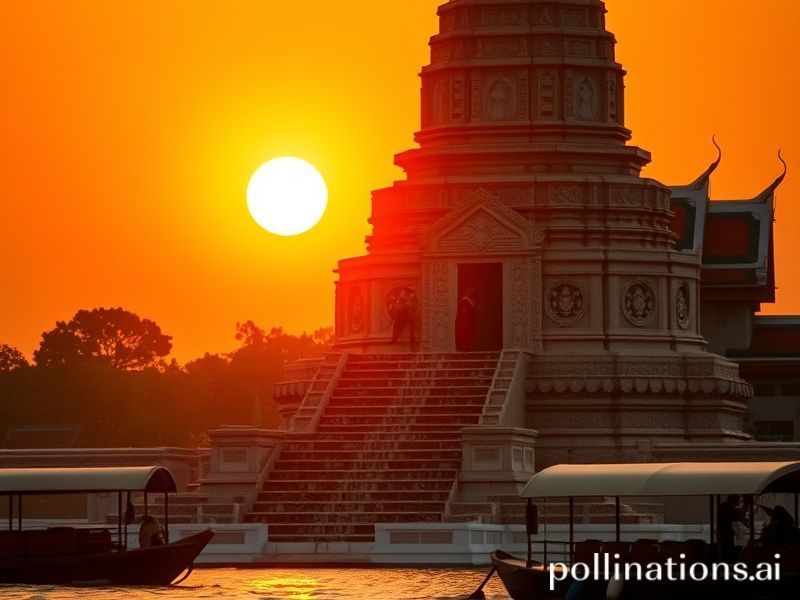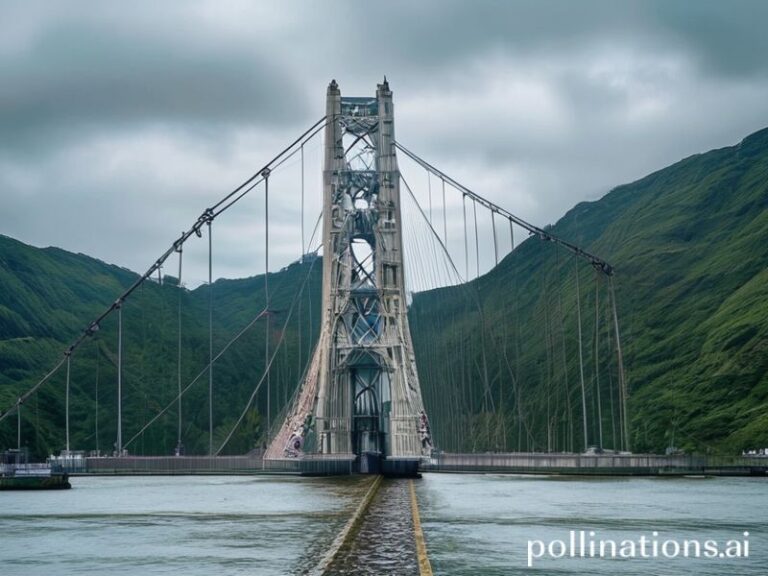Thailand’s Indifferent Smile: Why the World Keeps Losing Its Shirt in Bangkok (and Loving It)
**Bangkok’s Eternal Return: Why Thailand Keeps Seducing the World (and Then Sending It Home in a Tuk-Tuk of Regret)**
By the time your flight descends through the petrochemical haze above Suvarnabhumi, you’ve already joined a centuries-old parade of outsiders who arrived certain they could bend the Kingdom to their will. The Portuguese came with cannon, the Japanese with capital, the CIA with heroin and “advisors,” and now every hedge-fund oracle lands clutching a color-coded spreadsheet predicting when Thailand will finally become “the next Korea.” Spoiler: the spreadsheet always loses to the jungle.
Thailand’s greatest export isn’t rice, sex, or even that aggressively cheerful detergent-commercial smile. It’s the recurring lesson that no empire—financial, military, or cultural—can stay sober here for long. The country has shrugged off 19 constitutions, seven military coups in living memory, and a pandemic that murdered its tourism cash cow faster than you can say “one more bucket of Singha.” Yet the baht remains irritatingly sturdy, the street food still costs less than a therapist co-pay, and the royal palace still glitters like a Beyoncé halftime show. If resilience were an Olympic sport, Thailand would medal but refuse to attend the closing ceremony on the grounds that it’s “too structured.”
Globally, Bangkok is the canary in capitalism’s coal mine. When China sneezes, Thailand’s tour guides reach for Kleenex made in Guangzhou. When the Fed hikes rates, Bangkok’s condo developers—who’ve spent a decade building glass sarcophagi for ghosts with Hong Kong passports—suddenly remember that karma is adjustable-rate. The Kingdom’s fiscal mood swings are now the world’s recessionary mood ring: if you want to know whether global discretionary income has finally bled out, check how many $12 rooftop cocktails the rooftop bartenders at Octave are power-blending.
Meanwhile, the West keeps outsourcing its midlife crises here. German retirees on fixed pensions colonize Chiang Mai’s coffee shops, whispering about “quality of life” while pretending the smoke season isn’t the agricultural equivalent of a chain-smoking dragon. Silicon Valley burnouts arrive pledging to “build ethical blockchain for rice farmers,” then disappear into a Full Moon Party, re-emerging three months later with a tattoo of a QR code that no longer scans. Thailand thanks them for the foreign currency, then forgets their names faster than you can say “digital nomad visa overstay.”
There is, of course, the monarchy, that gilded Rorschach test foreigners project every fantasy onto: divine right, soap-opera intrigue, or the last firewall against a populist tsunami. When King Rama X flew to Bavaria with a retinue of poodles and a harem that could staff a mid-sized airline, the German foreign minister politely asked him not to govern from the Alpine foothills. The request was ignored; the poodles, presumably, remained non-committal. Yet back home, lese-majeste laws still insure that the monarchy’s Wikipedia page reads like a haiku written by a nervous lawyer. The takeaway for outside observers: if you want to test how free your speech actually is, try critiquing a Thai prince on Twitter. Pro tip: don’t.
And still the world keeps landing, because Thailand is the planet’s most affordable existential crisis. Where else can you breakfast on $1 Michelin-star noodles, lunch on climate-change floods that arrive exactly on schedule (monsoon: 3 p.m., like a Swiss train made of water), and dinner on the realization that every political party here has the life expectancy of a mayfly with a cocaine habit? The Kingdom offers a full-spectrum reminder that modernity is just barbarism with better Wi-Fi—although, post-coup, the Wi-Fi sometimes vanishes too.
So we circle back, generation after generation, certain we’ll crack the code. We leave with the same souvenir: the knowledge that Thailand was never broken, merely indifferent to our urgency. The tuk-tuk of regret isn’t a bug; it’s the national transit policy. And somewhere on the tarmac, as your departure taxi revs its engines, you’ll swear you’ll never return—right before the cabin crew welcomes you aboard with that ubiquitous smile, the one that knows you absolutely will.







